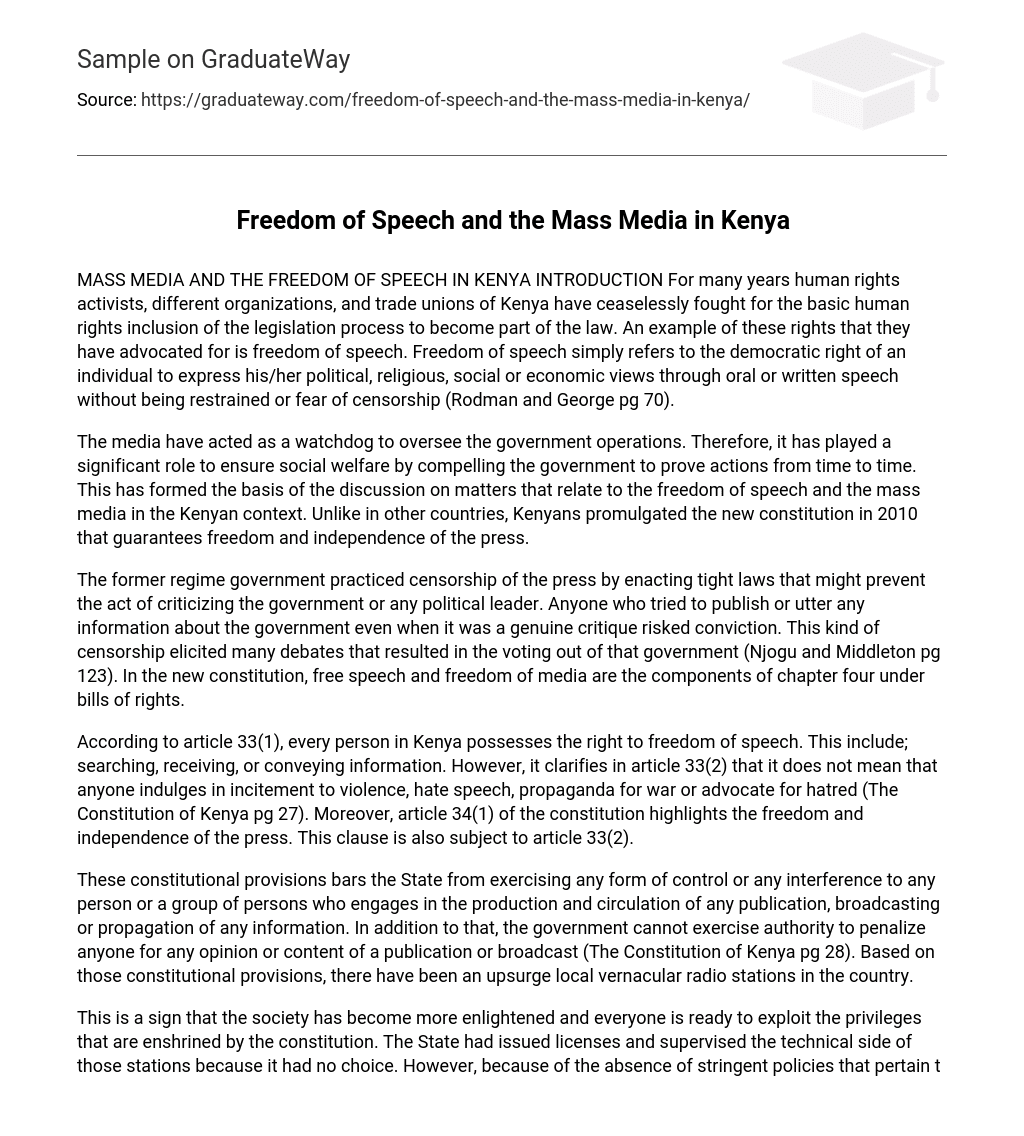INTRODUCTION
For many years human rights activists, different organizations, and trade unions of Kenya have ceaselessly fought for the basic human rights inclusion of the legislation process to become part of the law. An example of these rights that they have advocated for is freedom of speech. Freedom of speech simply refers to the democratic right of an individual to express his/her political, religious, social or economic views through oral or written speech without being restrained or fear of censorship.
The media have acted as a watchdog to oversee the government operations. Therefore, it has played a significant role to ensure social welfare by compelling the government to prove actions from time to time. This has formed the basis of the discussion on matters that relate to the freedom of speech and the mass media in the Kenyan context. Unlike in other countries, Kenyans promulgated the new constitution in 2010 that guarantees freedom and independence of the press.
The former regime government practiced censorship of the press by enacting tight laws that might prevent the act of criticizing the government or any political leader. Anyone who tried to publish or utter any information about the government even when it was a genuine critique risked conviction. This kind of censorship elicited many debates that resulted in the voting out of that government. In the new constitution, free speech and freedom of media are the components of chapter four under bills of rights.
According to article 33, every person in Kenya possesses the right to freedom of speech. This include; searching, receiving, or conveying information. However, it clarifies in article 33 that it does not mean that anyone indulges in incitement to violence, hate speech, propaganda for war or advocate for hatred. Moreover, article 34 of the constitution highlights the freedom and independence of the press. This clause is also subject to article 33.
These constitutional provisions bars the State from exercising any form of control or any interference to any person or a group of persons who engages in the production and circulation of any publication, broadcasting or propagation of any information. In addition to that, the government cannot exercise authority to penalize anyone for any opinion or content of a publication or broadcast. Based on those constitutional provisions, there have been an upsurge local vernacular radio stations in the country.
This is a sign that the society has become more enlightened and everyone is ready to exploit the privileges that are enshrined by the constitution. The State had issued licenses and supervised the technical side of those stations because it had no choice. However, because of the absence of stringent policies that pertain to communication, there has an emerging trend in the ownership of those radio stations. Almost all of them are concentrated in the hands of a corporation or a single person. This has helped and encouraged them to manipulate public opinion through the content of their programs.
This has portrayed the media in Kenya as an overused tool that is keen on serving the interests of a particular group of people contrasting their statutory requirements of serving interests of the public at large. We can observe that as much as freedom of speech and media independence is widely advocated for, they may become so retrogressive to the government policies when they are untamed. This is because when the actions of the media become so extensive, their degree of influence also become enormous to the extent of attempting sabotage of the government’s socio-economic efforts.
The media can also use its freedom as a shield to intrude into people’s privacy or even destroy their well-established reputations. In this sense, the press should not overstep their limits to an extent of discussing issues that may compromise national security. For example, that of discussing topics that may expose military secrets. Although as a nation everyone has a mandate to make sure that either political or artistic ideas circulate freely, for democracy to prevail, the idea of hate speech has disastrous effects to cohesion and reconciliation efforts especially when it is via media to the public.
For example, recently a certain member of parliament Nairobi was inciting his tribesmen to chase away another tribe from his constituency through a television interview. This resulted into bloody clashes between those two communities resulting to many deaths. If at all government censorship was in place, that TV channel should have been held accountable. All this clearly signifies that the media has made a drastic turn from their first assignment of playing an unofficial watchdog role to profit maximization instruments.
Nowadays, media houses in Kenya seem to be obsessed with profit-making and not content delivery. They always concentrate on things that grab their readers, viewers, or listeners’ attention to enjoy large audience following. Their discussion topics usually lack true political, social, or economic importance. In conclusion, the Kenyan government has recently been aggressive when it comes to curbing this unusual trend in media. For instance, the government lately checks closely all types and forms media activities.
However, print media is highly scrutinized compared with television and radio. This is because television and radio operate under licenses.
REFERENCES:
Njogu and Middleton, eds. Media and Identity in Africa, Edinburgh: Edinburgh University Press, 2009. Print. Rodman, George. Making Sense of Media: An introduction to Mass Communication, London: Pearson Education Company, 2001. Print. The Republic of Kenya. The Proposed Constitution of Kenya, Nairobi: Government Printing Press, 6th May, 2010. Print





